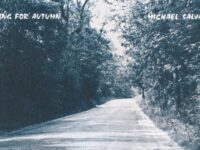There’s something at once familiar, and entirely brand new, about Turkish drummer Ferit Odman’s just-released Autumn In New York.
Taking his cue from jazz drumming and bandleading legend Art Blakey, Odman investigates a series of tunes associated with the Blakey band, and even includes former members of the Jazz Messengers collective. Odman, however, performs with a carefully wrought sensitivity that the hard-hitting Blakey rarely allowed for himself. This gives Autumn In New York a touch of the edgy bop intensity of the best Jazz Messengers projects but with a much more songful delicacy.
Like Blakey, Odman’s a quietly forceful leader throughout, building tension within the tracks that is then vigorously resolved by his bandmates. But he’s not prone to the sweeping gesture, nor the lengthy solo, so while this is a drummer-led record, Autumn In New York remains a showcase for his talented sidemen.
That starts with a smartly swinging version of late-1950s Blakey sideman Benny Golson’s “Step Lightly,” as Odman provides a perfect underpinning to the soaring interplay between trumpeter Terell Stafford and alto saxophonist Vincent Herring. Stafford’s solo is a soaring delight, as he reaches into his highest register without ever sounding shrill or out of control. Herring then pulls the reins hard for a soulful turn, boasting a fat, approachable sound here that’s not unlike Julian “Cannonball” Adderley. If anything, pianist Anthony Wonsey and bassist Peter Washington (himself an 1980s-era member of the Jazz Messengers) become even more considered – exploring a diaphanous, half-lit series of figures together before the horns return to restate Golson’s timelessly involving theme.
Stafford takes a half-step forward in the mix for what appears to be an urbane mid-tempo take by the Odman group on “Alter Ego,” the first of a series of tracks on Autumn In New York written by late-1970s Blakey alum James Williams. Soon, however, things are heating up nicely. Stafford’s subsequent solo, with Odman confidently urging him on from the drum chair, is bright and complex – bringing in the soul of Miles Davis and the speed of Freddie Hubbard. When Herring (who also played with Blakey before his passing in 1990) returns to the fore, he sounds likewise emboldened, playing with a fiery determination that perfectly dovetails with Odman’s more forceful fills. Wonsey performs with a cascading contrast, again pulling the song into a slightly more contemplative moment, before “Alter Ego” concludes with an urgent, interesting restatement.
[SOMETHING ELSE! REWIND: Ferit Odman’s debut, this year’s ‘Nommo,’ is a collaborative, almost communal, effort that also features Vincent Herring and Peter Washington.]
Vernon Duke’s title track begins as another vehicle for Stafford, who this time settles into an appropriately lonesome wail. His turn is both haunting and nearly weightless, a perfect declamation of fall’s plaintive ruminations. Wonsey, Odman and Washington again play with an almost invisible luminosity.
Williams’ “The Soulful Mr. Timmons,” written in tribute to late-1950s Blakey pianist Bobby Timmons, provides Odman with a chance to perform with a charging urgency behind twin blasts of funky soul from Herring and Stafford. But, as expected, the tune turns on these fleet expressions of swinging joy by Wonsey. After a series of impressive displays both of stillness and striking emotion in his earlier performances, Wonsey simply cuts loose here – and to great effect. There’s a similarly expressed boundless enthusiasm, this time from the whole group, as “Hindsight” follows. The tune, from 1960s-era Blakey keyboardist/arranger Cedar Walton, is defined by boisterous, conversational statements between Herring and Wonsey – hurried along by a restless polyrhythm courtesy of Odman.
Herring finds his own moment in the spotlight during the vintage ballad “My Ideal,” performing with an anguished beauty. Odman and Co. then finish Autumn In New York with a surging rendition of “Changing of the Guard,” the final composition from Williams. It’s an appropriate sentiment, on a record that finds Odman paying tribute to, but never confining himself to, the ageless legacy of a jazz hero in Blakey.
[amazon_enhanced asin=”B0067D83JE” container=”” container_class=”” price=”All” background_color=”FFFFFF” link_color=”000000″ text_color=”0000FF” /] [amazon_enhanced asin=”B000T3NMYE” container=”” container_class=”” price=”All” background_color=”FFFFFF” link_color=”000000″ text_color=”0000FF” /] [amazon_enhanced asin=”B002L6HE9G” container=”” container_class=”” price=”All” background_color=”FFFFFF” link_color=”000000″ text_color=”0000FF” /] [amazon_enhanced asin=”B004FNC1G4″ container=”” container_class=”” price=”All” background_color=”FFFFFF” link_color=”000000″ text_color=”0000FF” /] [amazon_enhanced asin=”B0000006KH” container=”” container_class=”” price=”All” background_color=”FFFFFF” link_color=”000000″ text_color=”0000FF” /]
- Nick DeRiso’s Best of 2015 (Rock + Pop): Death Cab for Cutie, Joe Jackson, Toto + Others - January 18, 2016
- Nick DeRiso’s Best of 2015 (Blues, Jazz + R&B): Boz Scaggs, Gavin Harrison, Alabama Shakes - January 10, 2016
- Nick DeRiso’s Best of 2015 (Reissues + Live): John Oates, Led Zeppelin, Yes, Faces + others - January 7, 2016



